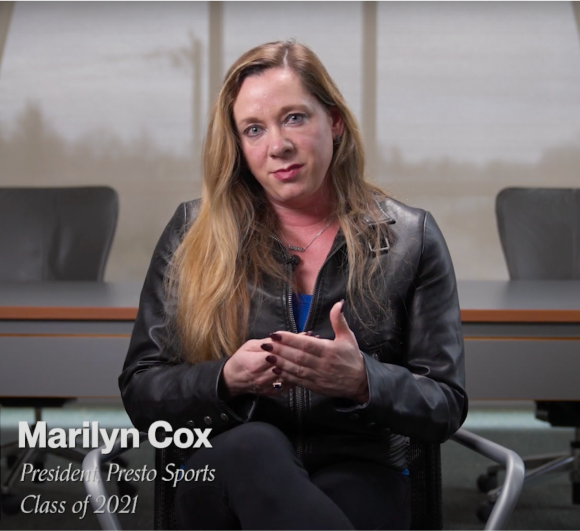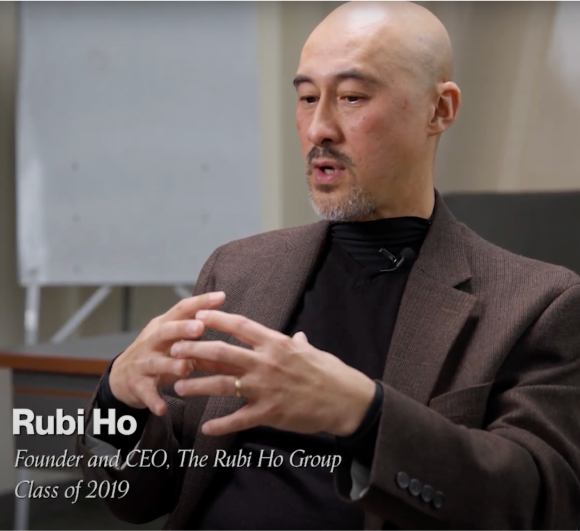Designed for seasoned and aspiring corporate executives, the EMBA at Xavier University immerses you in a rigorous and collaborative environment to strengthen your leadership, team-building and problem-solving competencies. The program consists of 17 business courses, totaling 48 credit hours, and utilizes a cohort-based learning model.
Please Note: International applicants— meaning those that require an F1 study visa— are not eligible for EMBA admission given the structure and timeline of the program. International applicants are invited to apply for admission to Xavier's full-time MBA program.
To be considered for admission into the MBA program, you must submit the following materials: You are considered for admission into the program once all application materials have been received.
Semester 1
- ACCT 750 Accounting for Business Leaders (3cr)
- BUAD 751 Integrative Project 1 (3cr)
- ECON 750 Economcs for Business Leaders (3cr)
- MKTG 750 Marketing for Business Leaders (3cr)
Semester 2
- BAIS 755 Business Analytics (3cr)
- BUAD 752 Capstone Project Phase 1 (3cr)
- BUAD 759 Contemporary Topics in Financial Mgmt (1cr)
- FINC 750 Finance for Business Leaders (3cr)
- MGMT 751 Leading Organizations - Macro (3cr)
Semester 3
- BAIS 752 Operations Management (3cr)
- BUAD 754 Capstone Project Phase 2 (3cr)
- BUAD 757 Contemporary Topics in Organizational Growth 1 (1cr)
- MGMT 752 Innovation (3cr)
Semester 4
- BLAW 755 Business Law & Ethics (3cr)
- BUAD 755 International Residency (4cr)
- BUAD 756 Capstone Project Phase 3 (1cr)
- BUAD 760 Contemporary Topics in Business Technology 1 (1cr)
- BUAD 758 Contemporary Topics in Organizational Growth 2 (1cr)
- BUAD 761 Contemorary Topics in Business Technology 2 (1cr)
- MGMT 753 Strategic Leadership (3cr)
Xavier University’s Executive MBA program is proud to be one of the longest-standing programs in the country. Founded in 1978 by the first Williams College of Business dean, Thomas Hailstones, our EMBA has been rooted in academic excellence and experiential learning.
During the 16-month program, students participate in real-world integrative consulting projects with regional companies, providing recommendations for corporate growth. Hands-on consulting assignments make up 8.5 credit hours, and other courses during the program include various forms of experiential learning.
- BUAD 751 – A 12-week course in which students apply an integrated approach of classwork from Strategy, Finance and Marketing to develop a strategic recommendation for a local small business ($1M - $10M in annual sales).
- BUAD 752/754 – A six-month capstone project with a different set of client companies, requiring a full-scale internal and external analysis. Students identify, select, plan and provide an implementation strategy to senior management.
As a part of the EMBA program, students embark on a 10-day international residency experience. The location changes each year and is influenced by the faculty's connections and students' interest and input. While many students in the program have traveled internationally, this residency remains one of the most memorable and influential parts of every student’s graduate experience.
Learning objectives include:
- Understanding the cultural, economic, political and business environment of the countries visited.
- Identifying important issues associated with the global business environment.
- Achieving a working knowledge of local business practices through direct interaction with local managers and government officials.
- Exploring the value of different economic models as benchmarks for global business practices.
- Developing a greater appreciation of the many differences and similarities among people living in other parts of the world.
Xavier's EMBA program provides students with:
- An in-depth study and analysis of some of the world’s most important emerging markets, including an immersive international business trip.
- The solutions industries are developing when facing disruptive business models (and how to lead disruption in your organization).
- Experience working among and with high-caliber professionals across industries on real-world, client-facing strategy projects.
- The study of 21st-century strategic business models and processes.
- Identification of strategic implications and ability to understand the underlying financial drivers in today’s financial markets.
- A survey of today’s emerging technologies.
Tuition
- Executive MBA Program..............$1,600
Fees
- Student ID Fee..............$15
- Graduate Student Association Fee, degree-seeking full-time..............$15 (per semester)
- Graduate Student Association Fee, degree-seeking part-time..............$10 (per semester)
For the full, official listing, please visit xavier.edu/costs.
Xavier University reserves the right to correct any computational or clerical errors.
Why Choose Xavier’s EMBA program?
Classes meet twice a month in person on Fridays and Saturdays, allowing the flexibility to earn your degree while maintaining your work schedule.
During the EMBA program capstone project, you’ll work directly with organizations in the Cincinnati business community, from Fortune 500 companies to small businesses.
Benefit from a rigorous curriculum, top-tier faculty and unparalleled career opportunities at our AACSB-accredited school.
MBA programs at Xavier University no longer require the GMAT or GRE test scores of applicants for admission.
Alumni Making an Impact

“I entered Xavier’s EMBA program as a vice president of marketing. Shortly after I graduated from Xavier, I received the opportunity to become President of PrestoSports.”

When I think about having a curriculum and program that not only teaches you the "how to," but the "how to" in the context of where you are, I can't think of a better program. It wasn't just spreadsheets.”

What I found from Xavier specifically was that touch, emphasizing not only the competence of the program but also the relationships and genuine interest they showed in me as a human being.”
Meet Scott Beck, senior teaching professor in Xavier's Williams College of Business.
The Williams College of Business (WCB), home to Xavier’s MBA programs, has been nationally recognized for its outstanding educational experience and the success of its students and faculty.
More MBA Programs from Xavier
Explore Xavier University's diverse MBA programs, designed to fit your schedule and career goals with flexible options.

Full-Time MBA

Part-Time MBA

Online MBA (full-time and part-time)

Accelerated 4+1 MBA
FAQ
Xavier University's EMBA program is designed to equip you with the knowledge, skills, and network to excel in today's dynamic business landscape. Learn more.
While EMBA and MBA programs share many similarities, there are distinguishing features and differences. The primary difference between an EMBA and an MBA is the type of student who enrolls in the program. EMBAs typically attract high-achieving individuals who are currently working in a leadership or managerial capacity at a business or organization. They’re ready to discuss the basics and nuances of business and immediately apply them to their workplaces.
Applicants
- EMBA - Generally need five years or more of managerial or corporate leadership experience, but may have less.
- MBA - Can apply directly out of undergraduate school.
Course Schedules
- EMBA - Courses are typically scheduled during weekends and weeknights to accommodate business leaders who work full-time.
- MBA - Full-time program course schedules are generally offered during the daytime. Part-time programs may offer courses during the weekend and on weeknights.
Program Length
- EMBA - can take anywhere from 16 months to two years.
- MBA - One to four years, depending on whether the program is full time or part time.
Lifestyle
- EMBA - EMBA students typically work full time and hold positions in management and corporate leadership.
- MBA - MBA students can work full-time or part-time, or they might be full-time students. They may have entry-mid level experience, or none at all.
Xavier University’s EMBA program is an in-person program. Classes will be held at Xavier's campus in Cincinnati, Ohio.
Xavier's EMBA is a 16-month program.
Yes, Xavier University's MBA program is accredited by the Association to Advance Collegiate Schools of Business (AACSB). AACSB accreditation is considered the highest standard of achievement for business schools worldwide.

Executive MBA (EMBA) Program at Xavier University
Elevate your expertise, diversify your skill set and forge powerful partnerships by earning your Executive Master of Business Administration at Xavier University. Xavier University's Williams College of Business is accredited by the AACSB. AACSB-accredited schools offer students a relevant and challenging curriculum, the highest quality faculty and career opportunities that are not found at other business schools. Xavier University is a private university located in Cincinnati, Ohio, providing a liberal arts education in the Jesuit Catholic tradition. Founded in 1831, the University is the sixth-oldest Catholic university in the nation. It has been ranked among the top 10 master's-level universities in the Midwest by U.S. News and World Report for the past two decades. The Princeton Review names it one of the "Best 385 Colleges in America."
Xavier University's Williams College of Business is accredited by the AACSB. AACSB-accredited schools offer students a relevant and challenging curriculum, the highest quality faculty and career opportunities that are not found at other business schools.
Xavier University is a private university located in Cincinnati, Ohio, providing a liberal arts education in the Jesuit Catholic tradition. Founded in 1831, the University is the sixth-oldest Catholic university in the nation. It has been ranked among the top 10 master's-level universities in the Midwest by U.S. News & World Report for the past two decades. The Princeton Review names it one of the "Best 385 Colleges in America."
